En-Pei Hu
DeSTA2.5-Audio: Toward General-Purpose Large Audio Language Model with Self-Generated Cross-Modal Alignment
Jul 03, 2025Abstract:We introduce DeSTA2.5-Audio, a general-purpose Large Audio Language Model (LALM) designed for robust auditory perception and instruction-following, without requiring task-specific audio instruction-tuning. Recent LALMs typically augment Large Language Models (LLMs) with auditory capabilities by training on large-scale, manually curated or LLM-synthesized audio-instruction datasets. However, these approaches have often suffered from the catastrophic forgetting of the LLM's original language abilities. To address this, we revisit the data construction pipeline and propose DeSTA, a self-generated cross-modal alignment strategy in which the backbone LLM generates its own training targets. This approach preserves the LLM's native language proficiency while establishing effective audio-text alignment, thereby enabling zero-shot generalization without task-specific tuning. Using DeSTA, we construct DeSTA-AQA5M, a large-scale, task-agnostic dataset containing 5 million training samples derived from 7,000 hours of audio spanning 50 diverse datasets, including speech, environmental sounds, and music. DeSTA2.5-Audio achieves state-of-the-art or competitive performance across a wide range of audio-language benchmarks, including Dynamic-SUPERB, MMAU, SAKURA, Speech-IFEval, and VoiceBench. Comprehensive comparative studies demonstrate that our self-generated strategy outperforms widely adopted data construction and training strategies in both auditory perception and instruction-following capabilities. Our findings underscore the importance of carefully designed data construction in LALM development and offer practical insights for building robust, general-purpose LALMs.
Building a Taiwanese Mandarin Spoken Language Model: A First Attempt
Nov 11, 2024



Abstract:This technical report presents our initial attempt to build a spoken large language model (LLM) for Taiwanese Mandarin, specifically tailored to enable real-time, speech-to-speech interaction in multi-turn conversations. Our end-to-end model incorporates a decoder-only transformer architecture and aims to achieve seamless interaction while preserving the conversational flow, including full-duplex capabilities allowing simultaneous speaking and listening. The paper also details the training process, including data preparation with synthesized dialogues and adjustments for real-time interaction. We also developed a platform to evaluate conversational fluency and response coherence in multi-turn dialogues. We hope the release of the report can contribute to the future development of spoken LLMs in Taiwanese Mandarin.
REBORN: Reinforcement-Learned Boundary Segmentation with Iterative Training for Unsupervised ASR
Feb 06, 2024Abstract:Unsupervised automatic speech recognition (ASR) aims to learn the mapping between the speech signal and its corresponding textual transcription without the supervision of paired speech-text data. A word/phoneme in the speech signal is represented by a segment of speech signal with variable length and unknown boundary, and this segmental structure makes learning the mapping between speech and text challenging, especially without paired data. In this paper, we propose REBORN, Reinforcement-Learned Boundary Segmentation with Iterative Training for Unsupervised ASR. REBORN alternates between (1) training a segmentation model that predicts the boundaries of the segmental structures in speech signals and (2) training the phoneme prediction model, whose input is a segmental structure segmented by the segmentation model, to predict a phoneme transcription. Since supervised data for training the segmentation model is not available, we use reinforcement learning to train the segmentation model to favor segmentations that yield phoneme sequence predictions with a lower perplexity. We conduct extensive experiments and find that under the same setting, REBORN outperforms all prior unsupervised ASR models on LibriSpeech, TIMIT, and five non-English languages in Multilingual LibriSpeech. We comprehensively analyze why the boundaries learned by REBORN improve the unsupervised ASR performance.
Findings of the 2023 ML-SUPERB Challenge: Pre-Training and Evaluation over More Languages and Beyond
Oct 09, 2023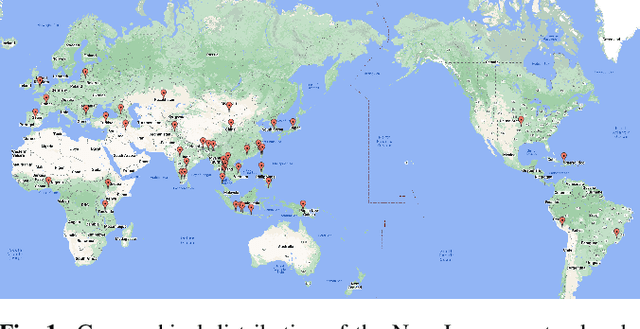

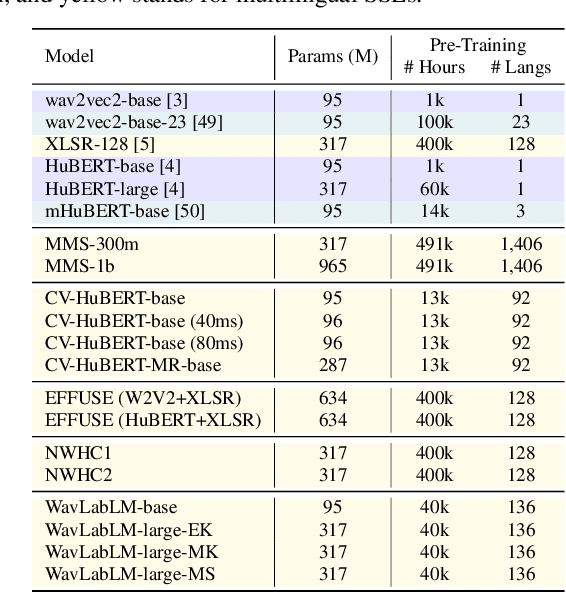
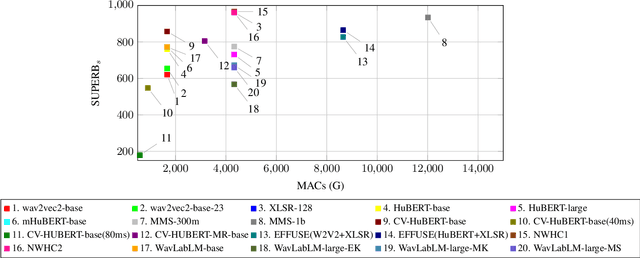
Abstract:The 2023 Multilingual Speech Universal Performance Benchmark (ML-SUPERB) Challenge expands upon the acclaimed SUPERB framework, emphasizing self-supervised models in multilingual speech recognition and language identification. The challenge comprises a research track focused on applying ML-SUPERB to specific multilingual subjects, a Challenge Track for model submissions, and a New Language Track where language resource researchers can contribute and evaluate their low-resource language data in the context of the latest progress in multilingual speech recognition. The challenge garnered 12 model submissions and 54 language corpora, resulting in a comprehensive benchmark encompassing 154 languages. The findings indicate that merely scaling models is not the definitive solution for multilingual speech tasks, and a variety of speech/voice types present significant challenges in multilingual speech processing.
ML-SUPERB: Multilingual Speech Universal PERformance Benchmark
May 18, 2023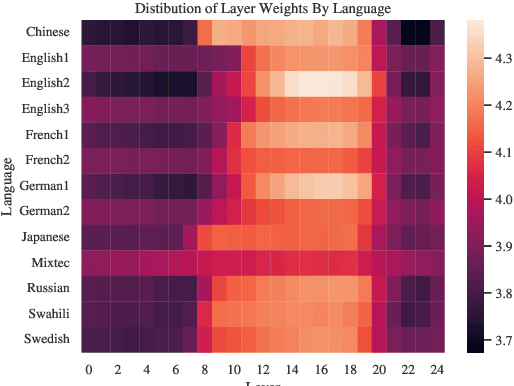
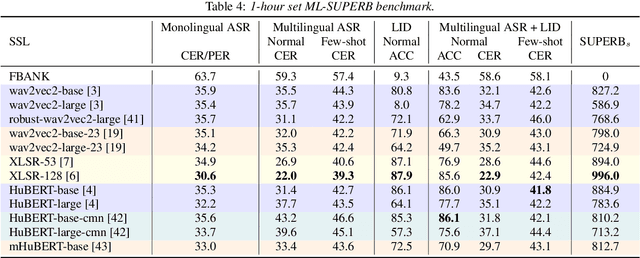
Abstract:Speech processing Universal PERformance Benchmark (SUPERB) is a leaderboard to benchmark the performance of Self-Supervised Learning (SSL) models on various speech processing tasks. However, SUPERB largely considers English speech in its evaluation. This paper presents multilingual SUPERB (ML-SUPERB), covering 143 languages (ranging from high-resource to endangered), and considering both automatic speech recognition and language identification. Following the concept of SUPERB, ML-SUPERB utilizes frozen SSL features and employs a simple framework for multilingual tasks by learning a shallow downstream model. Similar to the SUPERB benchmark, we find speech SSL models can significantly improve performance compared to FBANK features. Furthermore, we find that multilingual models do not always perform better than their monolingual counterparts. We will release ML-SUPERB as a challenge with organized datasets and reproducible training scripts for future multilingual representation research.
Hierarchical Programmatic Reinforcement Learning via Learning to Compose Programs
Jan 30, 2023



Abstract:Aiming to produce reinforcement learning (RL) policies that are human-interpretable and can generalize better to novel scenarios, Trivedi et al. (2021) present a method (LEAPS) that first learns a program embedding space to continuously parameterize diverse programs from a pre-generated program dataset, and then searches for a task-solving program in the learned program embedding space when given a task. Despite encouraging results, the program policies that LEAPS can produce are limited by the distribution of the program dataset. Furthermore, during searching, LEAPS evaluates each candidate program solely based on its return, failing to precisely reward correct parts of programs and penalize incorrect parts. To address these issues, we propose to learn a meta-policy that composes a series of programs sampled from the learned program embedding space. By composing programs, our proposed method can produce program policies that describe out-of-distributionally complex behaviors and directly assign credits to programs that induce desired behaviors. We design and conduct extensive experiments in the Karel domain. The experimental results show that our proposed framework outperforms baselines. The ablation studies confirm the limitations of LEAPS and justify our design choices.
 Add to Chrome
Add to Chrome Add to Firefox
Add to Firefox Add to Edge
Add to Edge